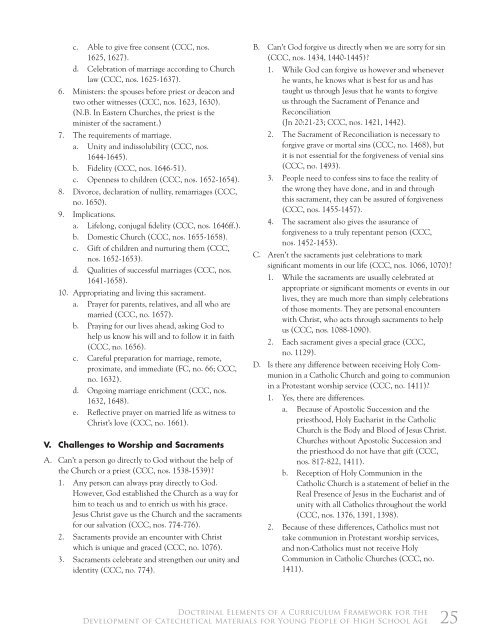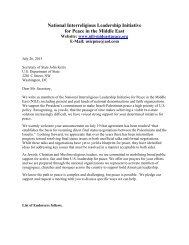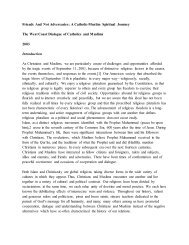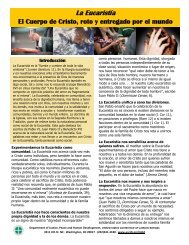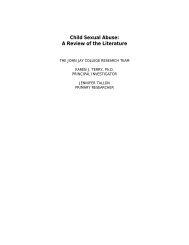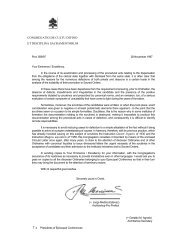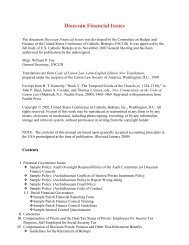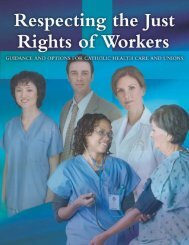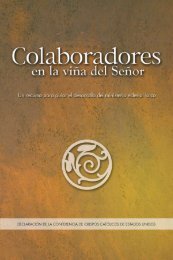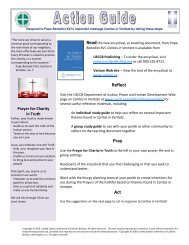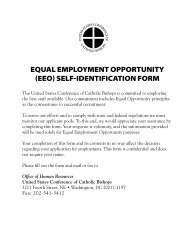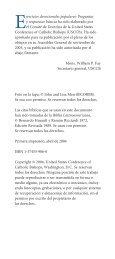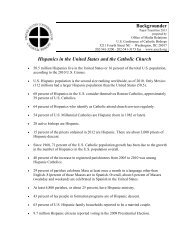Doctrinal Elements of a Curriculum Framework for the Development ...
Doctrinal Elements of a Curriculum Framework for the Development ...
Doctrinal Elements of a Curriculum Framework for the Development ...
- No tags were found...
You also want an ePaper? Increase the reach of your titles
YUMPU automatically turns print PDFs into web optimized ePapers that Google loves.
c. Able to give free consent (CCC, nos.1625, 1627).d. Celebration <strong>of</strong> marriage according to Churchlaw (CCC, nos. 1625-1637).6. Ministers: <strong>the</strong> spouses be<strong>for</strong>e priest or deacon andtwo o<strong>the</strong>r witnesses (CCC, nos. 1623, 1630).(N.B. In Eastern Churches, <strong>the</strong> priest is <strong>the</strong>minister <strong>of</strong> <strong>the</strong> sacrament.)7. The requirements <strong>of</strong> marriage.a. Unity and indissolubility (CCC, nos.1644-1645).b. Fidelity (CCC, nos. 1646-51).c. Openness to children (CCC, nos. 1652-1654).8. Divorce, declaration <strong>of</strong> nullity, remarriages (CCC,no. 1650).9. Implications.a. Lifelong, conjugal fidelity (CCC, nos. 1646ff.).b. Domestic Church (CCC, nos. 1655-1658).c. Gift <strong>of</strong> children and nurturing <strong>the</strong>m (CCC,nos. 1652-1653).d. Qualities <strong>of</strong> successful marriages (CCC, nos.1641-1658).10. Appropriating and living this sacrament.a. Prayer <strong>for</strong> parents, relatives, and all who aremarried (CCC, no. 1657).b. Praying <strong>for</strong> our lives ahead, asking God tohelp us know his will and to follow it in faith(CCC, no. 1656).c. Careful preparation <strong>for</strong> marriage, remote,proximate, and immediate (FC, no. 66; CCC,no. 1632).d. Ongoing marriage enrichment (CCC, nos.1632, 1648).e. Reflective prayer on married life as witness toChrist’s love (CCC, no. 1661).V. Challenges to Worship and SacramentsA. Can’t a person go directly to God without <strong>the</strong> help <strong>of</strong><strong>the</strong> Church or a priest (CCC, nos. 1538-1539)?1. Any person can always pray directly to God.However, God established <strong>the</strong> Church as a way <strong>for</strong>him to teach us and to enrich us with his grace.Jesus Christ gave us <strong>the</strong> Church and <strong>the</strong> sacraments<strong>for</strong> our salvation (CCC, nos. 774-776).2. Sacraments provide an encounter with Christwhich is unique and graced (CCC, no. 1076).3. Sacraments celebrate and streng<strong>the</strong>n our unity andidentity (CCC, no. 774).B. Can’t God <strong>for</strong>give us directly when we are sorry <strong>for</strong> sin(CCC, nos. 1434, 1440-1445)?1. While God can <strong>for</strong>give us however and wheneverhe wants, he knows what is best <strong>for</strong> us and hastaught us through Jesus that he wants to <strong>for</strong>giveus through <strong>the</strong> Sacrament <strong>of</strong> Penance andReconciliation(Jn 20:21-23; CCC, nos. 1421, 1442).2. The Sacrament <strong>of</strong> Reconciliation is necessary t<strong>of</strong>orgive grave or mortal sins (CCC, no. 1468), butit is not essential <strong>for</strong> <strong>the</strong> <strong>for</strong>giveness <strong>of</strong> venial sins(CCC, no. 1493).3. People need to confess sins to face <strong>the</strong> reality <strong>of</strong><strong>the</strong> wrong <strong>the</strong>y have done, and in and throughthis sacrament, <strong>the</strong>y can be assured <strong>of</strong> <strong>for</strong>giveness(CCC, nos. 1455-1457).4. The sacrament also gives <strong>the</strong> assurance <strong>of</strong><strong>for</strong>giveness to a truly repentant person (CCC,nos. 1452-1453).C. Aren’t <strong>the</strong> sacraments just celebrations to marksignificant moments in our life (CCC, nos. 1066, 1070)?1. While <strong>the</strong> sacraments are usually celebrated atappropriate or significant moments or events in ourlives, <strong>the</strong>y are much more than simply celebrations<strong>of</strong> those moments. They are personal encounterswith Christ, who acts through sacraments to helpus (CCC, nos. 1088-1090).2. Each sacrament gives a special grace (CCC,no. 1129).D. Is <strong>the</strong>re any difference between receiving Holy Communionin a Catholic Church and going to communionin a Protestant worship service (CCC, no. 1411)?1. Yes, <strong>the</strong>re are differences.a. Because <strong>of</strong> Apostolic Succession and <strong>the</strong>priesthood, Holy Eucharist in <strong>the</strong> CatholicChurch is <strong>the</strong> Body and Blood <strong>of</strong> Jesus Christ.Churches without Apostolic Succession and<strong>the</strong> priesthood do not have that gift (CCC,nos. 817-822, 1411).b. Reception <strong>of</strong> Holy Communion in <strong>the</strong>Catholic Church is a statement <strong>of</strong> belief in <strong>the</strong>Real Presence <strong>of</strong> Jesus in <strong>the</strong> Eucharist and <strong>of</strong>unity with all Catholics throughout <strong>the</strong> world(CCC, nos. 1376, 1391, 1398).2. Because <strong>of</strong> <strong>the</strong>se differences, Catholics must nottake communion in Protestant worship services,and non-Catholics must not receive HolyCommunion in Catholic Churches (CCC, no.1411).<strong>Doctrinal</strong> <strong>Elements</strong> <strong>of</strong> a <strong>Curriculum</strong> <strong>Framework</strong> <strong>for</strong> <strong>the</strong><strong>Development</strong> <strong>of</strong> Catechetical Materials <strong>for</strong> Young People <strong>of</strong> High School Age25


